I'm creating a proof of concept to use cookie authentication with jwt's in aspnet core with a separate UI server (i.e. the UI is hosted on localhost:4200 and the backend on localhost:5001). This repo that exhibits this and the following problem can be found here. It based off of dotnet-labs/JwtAuthDemo. No matter how hard I try, I cannot seem to get the cookie to be set in the browser tab for the UI page despite the set-cookie header being clearly seen in the response header on login. I can only get the cookie to be set when I use the swagger page for the backend (which uses same site conventions).
Note: the original repo that this is based off of uses jwt's and session storage so the app works just fine. I'm trying to get the jwt set in a cross site cookie as a proof of concept with the following line HttpContext.Response.Cookies.Append("TestCookie", jwtResult.AccessToken, cookieOptions);
The flow is as follows:
I make a login request here
this.http.post<LoginResult>(`${this.apiUrl}/login`, { username, password })
It is then intercepted here where I try to add withCredentials or any headers
request = request.clone({
withCredentials: true
});
It is then received by the backend with the following CORS setup
services.AddCors(options =>
{
options.AddDefaultPolicy(
builder =>
{
builder
.WithOrigins("http://localhost:4200", "https://www.local.dev")
.AllowCredentials()
.WithHeaders("Content-Type")
.AllowAnyMethod();
}
);
});
It is then received by the following controller method where I try to set the cookie on this line
// Ommitting cookie options for brevity
HttpContext.Response.Cookies.Append("TestCookie", jwtResult.AccessToken);
// The source code doesn't have it, but I tried using various cookie options like the following
HttpContext.Response.Cookies.Append("TestCookie", jwtResult.AccessToken, new CookieOptions
{
SameSite = SameSiteMode.None
Secure = true
});
// and also the following among other configurations
HttpContext.Response.Cookies.Append("TestCookie", jwtResult.AccessToken, new CookieOptions
{
SameSite = SameSiteMode.Lax
});
The response is then received by the browser exactly like the responses posted in this stack overflow question. Secifically, this is what I receive in my browser:
The request comes back with the cookie as expected:
 But, alas, no cookie is set:
But, alas, no cookie is set:
 This happens even samesite=none and secure=true:
This happens even samesite=none and secure=true:

 When I login via the swagger page (which is same site), I get the following response:
When I login via the swagger page (which is same site), I get the following response:
 And I see the cookie is set:
And I see the cookie is set:
 It also works when samesite=none and secure=true
It also works when samesite=none and secure=true


I have tried all of the common things to solve this problem that the internet, especially the stack overflow community, recommends:
- make sure CORS is set properly
- I have all the proper headers set
- make sure samesite=lax is set or samesite=none with secure=true and https
- Neither works for this project either
- I have even gone as far to set up a reverse proxy on my local machine to get https on both the front end and back end (didn't work either)
- realize that chrome silently blocks any cross site cookies that don't have samesite=none, secure=true, and are sent over https
- I have even tried this on firefox and I can't get it working
- make sure withCredentials=true or credentials='include' on the request being sent
- I think this is just for sending cookies, not setting them, but it still doesn't work
Other solutions tried and resources consulted:
- https://stackoverflow.com/questions/46288437/set-cookies-for-cross-origin-requests
- I am actually experiencing this exact same problem with the same symptoms, but none of the solutions are working
- https://medium.com/swlh/7-keys-to-the-mystery-of-a-missing-cookie-fdf22b012f09
- https://github.com/axios/axios/issues/1553
- https://developer.mozilla.org/en-US/docs/Web/HTTP/Headers/Set-Cookie
- https://stackoverflow.com/questions/50511096/set-cookie-not-working-in-chrome
- https://stackoverflow.com/questions/50369779/cookie-not-being-set-in-browser
- https://stackoverflow.com/questions/60131986/why-chrome-can-t-set-cookie
- https://stackoverflow.com/questions/6970754/why-are-my-cookies-not-setting
- https://github.com/github/fetch/issues/386
- https://stackoverflow.com/questions/1134290/cookies-on-localhost-with-explicit-domain/1188145#1188145
- https://learn.microsoft.com/en-us/aspnet/core/security/cors?view=aspnetcore-5.0#credentials-in-cross-origin-requests
- https://stackoverflow.com/questions/7346919/chrome-localhost-cookie-not-being-set
- https://stackoverflow.com/questions/49065174/why-does-chrome-ignore-set-cookie-header
- https://medium.com/swlh/how-the-new-chrome-80-cookie-rule-samesite-none-secure-affects-web-development-c06380220ced
Given that all of the solutions point to the same solution and its not working for me, I must have set something up incorrectly or must be missing something really obvious. Perhaps there is a silent browser feature I'm not aware of? What is the issue here?